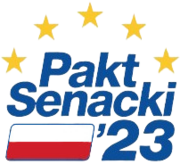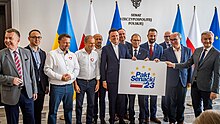Senate Pact 2023 Pakt Senacki 2023 | |
|---|---|
 | |
| Organizer | Zygmunt Frankiewicz |
| Founded | 28 February 2023 |
| Ideology | Pro-Europeanism |
| Political position | Big tent |
| Pact members |
|
| Colours | Blue Yellow |
| Senate | 65 / 100 |
| Website | |
| Twitter page | |

The Senate Pact 2023 (Polish: Pakt Senacki 2023) was an electoral alliance among the Civic Coalition (KO), the New Left (NL), the Polish People's Party (PSL) and Poland 2050 for the 2023 Polish Senate election. The accord was agreed on 28 February 2023 by party representatives Marcin Kierwiński (KO), Dariusz Wieczorek (NL), Piotr Zgorzelski (KP-PSL) and Jacek Bury (Poland 2050).
The agreement assumed close cooperation regarding the conduct of the election campaign; in each electoral district for the Senate of Poland, the constituent parties backed one common candidate. Candidates recommended by parties to the agreement and political parties cooperating had the exclusive right to use the official logo of the coalition.
To implement the agreement, an organizational team was established, whose work is managed by a representative of Yes! For Poland–Civic Coalition Senator Zygmunt Frankiewicz. The team's task is to divide the electoral districts into individual parties to the agreement, prepare proposals for candidates for Senators of the Republic of Poland and develop a concept for conducting an election campaign. The first informal Senate pact was concluded before the parliamentary elections in 2019.[1][2][3][4][5][6]
The Senate Pact 2023 was to also include the German Minority Electoral Committee, a political party representing the interests of German minority in Poland, located in Upper Silesia. However, the party refused to join the pact, stating that the program of the parties forming the Senate Pact 2023 was not satisfactory. In response, the New Left accused the German party of increasing the likelihood of Law and Justice victory. Despite refusing to join the pact, locally the German Minority Electoral Committee dropped out and endorsed Senate Pact 2023 candidates as long as they pledged to "actively expand regional self-government, develop the integration of the European community and work towards restoring German as a national minority language".[7]
The alliance won 66 seats out of 100 in the 11th term of the Senate which will sit from 2023 to 2027.
- ^ "Pakt senacki 2023. Opozycja startuje wspólnie do Senatu - konferencja prasowa" [Senate pact 2023. The opposition runs together for the Senate - press conference]. TVN24 (in Polish). 28 February 2023. Retrieved 6 March 2023.
- ^ "Pakt senacki podpisany. Kandydaci przed wakacjami" [Senate pact signed. Candidates before the holidays]. Polska Agencja Prasowa SA [Polish Press Agency] (in Polish). 28 February 2023. Retrieved 6 March 2023.
- ^ Szpala I, Dobrosz-Oracz J (28 February 2023). "Tak będzie wyglądał pakt senacki opozycji. "Wyborcza" ma dokument" [This is what the Senate pact of the opposition will look like. "Wyborcza" has the document]. Gazeta Wyborcza [The Electoral Gazette] (in Polish). Retrieved 6 March 2023.
- ^ Dziubka K (28 February 2023). "Opozycja ogłasza pakt senacki. Kulisy negocjacji" [The opposition announces the Senate pact. Behind the scenes of the negotiations]. Onet Wiadomości [Onet News] (in Polish). Retrieved 6 March 2023.
- ^ "Opozycja się dogadała. Przynajmniej tutaj będzie "jedna lista"" [The opposition got along. At least here will be "one list"]. wiadomosci.wp.pl (in Polish). 28 February 2023. Retrieved 6 March 2023.
- ^ "Opozycja i samorządowcy odtwarzają Pakt Senacki. Razem zawalczą o wynik wyborów" [The opposition and local government officials are recreating the Senate Pact. Together they will fight for the election result]. www.portalsamorzadowy.pl (in Polish). Retrieved 6 March 2023.
- ^ Majnusz, Mateusz (24 August 2023). "Zgrzyt na opozycji. Mniejszość Niemiecka ze swoim kandydatem do Senatu. Starosta Henryk Lakwa powalczy z Piotrem Woźniakiem i kandydatem PiS". Nasze Miasto (in Polish). Głuchołazy.
